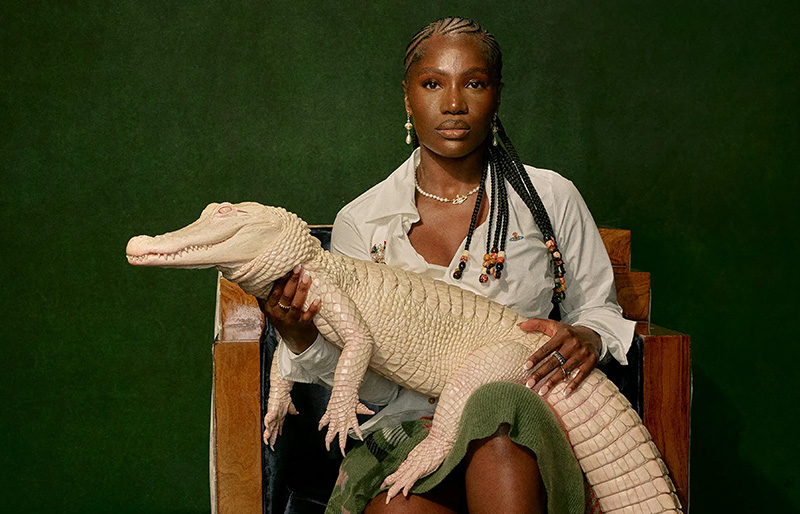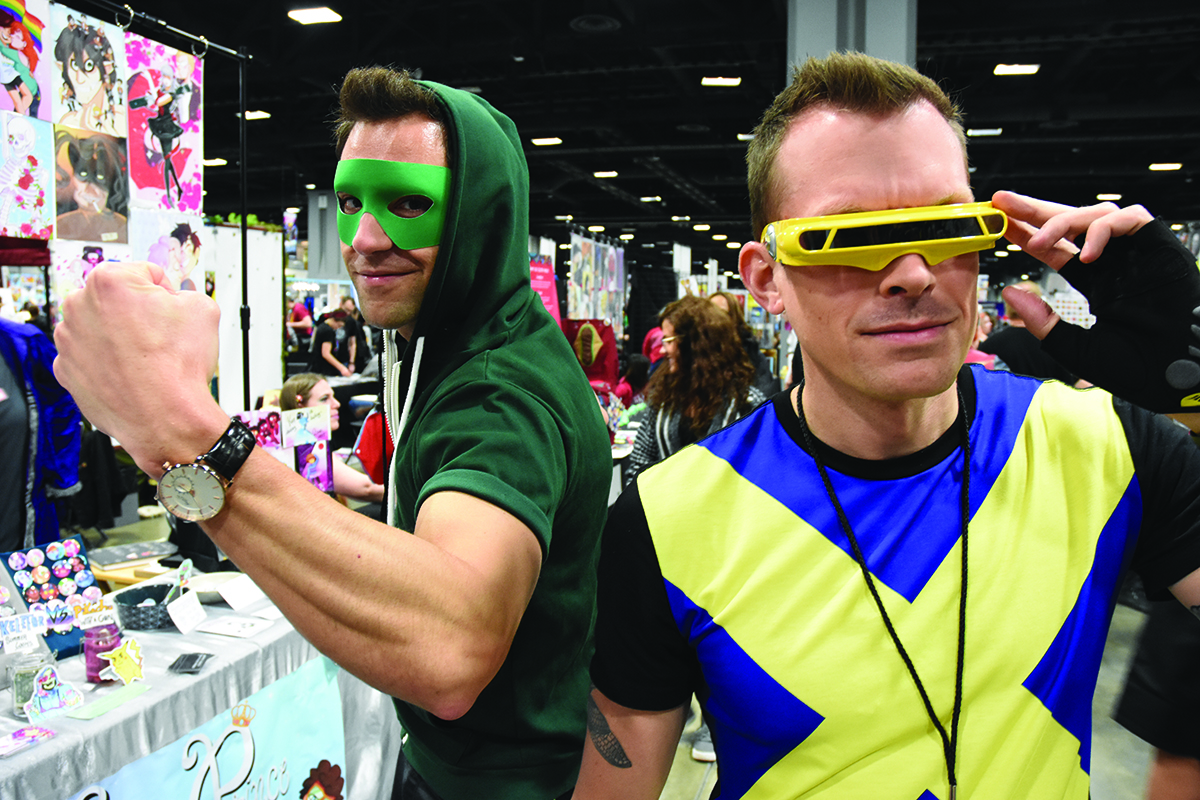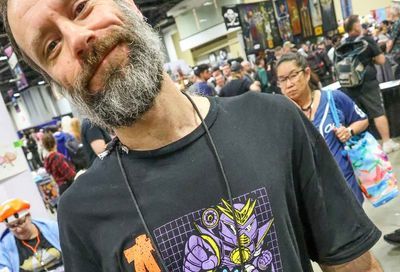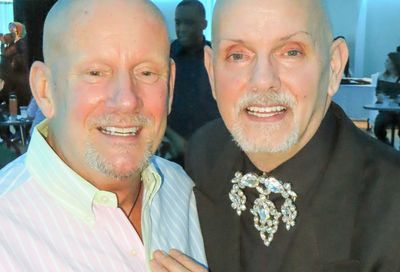Capital Pride’s Ryan Bos on his COVID-19 experience: ‘Take everything seriously’
Ryan Bos developed a sore throat in March. Two hospitalizations later, he wants everyone to follow the rules.

Ryan Bos was going about his business in early March when he started to develop a sore throat. He didn’t think much of it initially — after all, he had been suffering from seasonal allergies, and wrote it off as related to that.
Two days later, he developed a fever. But Bos still thought he was suffering from a sinus infection — a diagnosis that a doctor also gave via virtual appointment. Bos began taking antibiotics. His sore throat disappeared and his fever subsided. But, a week later, the executive director of the Capital Pride Alliance developed a cough and lost his sense of smell.
“I typically have congestion and postnasal drip and all that stuff during allergy season,” he says. “I didn’t think it was COVID-related. But a friend mentioned that they had heard about loss of smell being associated with COVID-19. So I went to GW Hospital to get tested and found out 11 days later that I was positive.”
For a full week, Bos couldn’t smell anything, but thought he had turned the corner when his sense of smell returned.
“I still had a lingering cough here and there, just at that point I was assuming it was part of the COVID. Fortunately, at the time I hadn’t experienced the shortness of breath, though I had experienced a lot of anxiety during the process… But then on April 10, I started to have some stomach issues, and by that evening, I could tell something was wrong.”
Six years earlier, Bos had battled diverticulitis, an inflammation in the digestive tract that results in severe abdominal pain, fever, and nausea. When the symptoms hit, he tried to tough it out. But by the morning of April 11, he was back in the emergency room and placed in the COVID unit, since he had previously tested positive for the virus.
Tests came back positive for diverticulitis, and Bos was admitted to the hospital. He was also tested twice more for COVID-19 — the first test came back negative, but the second was positive.
“They put me in isolation, put me on antibiotics,” he says. “Once my fever got under control and I was able to eat some solid foods they sent me home, which would have been Tuesday the 14th. I was still on antibiotics and my temperature seemed to stay under control until that Sunday, when my temperature started to come back in the evenings.”
Bos scheduled another virtual appointment with his doctor, who wondered if the temperature spike “was an allergic reaction to the drug, to the antibiotic.”
“Sometimes at the end of the antibiotic cycle you get a drug fever, so we were wondering if that’s what it was,” Bos says. “It spiked to its highest level that Tuesday, and started to come down. On Friday, my doctor had me stop taking all the antibiotics, assuming that if it was a drug fever, my temperature should still come down, but instead, my temperature went back up.”
Bos arrived back in the emergency room, where doctors determined that he had developed an abscess from the diverticulitis. They put in a tube to drain the abscess, but Bos developed sepsis, prolonging his hospital stay. As the fever began to subside and he became able to eat solid foods again, he was sent home, but the drain tube remained in until this past Thursday.
On April 27, Bos took to Facebook, writing a post to update his friends and family about his second hospitalization and provide them with a warning.
“Please note that my doctor and others have started to see a possible connection between GI inflammatory issues and COVID,” he wrote. “It’s not enough to take care of yourself, we must take care of each other!”
It was Bos’ primary doctor who drew the connection between his COVID infection and the diverticulitis. “She noted that she’s had several patients that have been getting GI inflammatory issues sort of following the traditional COVID symptoms. And then I got her in contact with the surgical doctor at GW that was assigned to me and they’re actually going to do some further research. And then I decided to do something, specifically because my doctor had made this correlation.”
Bos decided to alert others in case they were experiencing some of the same symptoms and could get tested for COVID. Since posting, several people reached out to him to share similar experiences and nearly identical symptoms.
Although Bos never developed the most common symptom of COVID-19 infection — shortness of breath — he had already made the mental connection between his positive test for COVID and his gastrointestinal issues.
“Once you have diverticulitis, you’re susceptible to getting it again, based on your diet, based on stress, anxiety and based on exercise,” Bos says. “But based on everything and the severity of it at that time, my doctor feels COVID had more of a direct correlation.”
Bos believes the changes that resulted from social distancing may have contributed to his flare-up. An avid runner, he wasn’t exercising as much. He wasn’t going to the grocery store or buying the types of healthy foods he normally would have gotten, and was experiencing feelings of stress and anxiety related to his initial symptoms. All of this, he believes, contributed to his most recent bout with gastrointestinal issues.
“Just being more restricted on exercise and not being as intentional on your diet, and the stress and anxiety around the unknown definitely takes a toll,” he notes. “Six years ago, I got diverticulitis right after Pride, and for many of the same reasons — stress, diet, and lack of exercise.
“You get excruciating pains in your midsection, abdomen area. For me, it’s so excruciating where you can’t find a position that’s comfortable, and it’s difficult to stand straight up because of the pain,” Bos explains. “It’s a mixture of shooting pains that go in phases, and then if you touch your stomach and abdomen, it’s very tender, especially on the opposite side of your appendix.”
Luckily for Bos, since the drain tube was removed last Thursday, he has not experienced any more complications, and does not believe he’ll need surgery to remove part of his colon, which is the treatment for the most severe forms of diverticulitis.
He’s currently on a low residue fiber diet, which he started after being sent home. Every morning and night, he checks his temperature as a precaution, and checks his blood pressure, which was low due to his illness. He has lost about 12 to 15 pounds since the beginning of his infection. In six to eight weeks, he’ll have to undergo a colonoscopy.
Bos credits his roommate for helping see him through the ordeal, as well as his primary care doctor for being vigilant and for serving as a calming presence so he did not overly stress when the symptoms were at their worst. He also credits his work colleagues for giving him space to temporarily step away, thus allowing him to recuperate and avoid additional stress while trying to heal.
Bos recommends that everyone take precautionary measures to avoid contracting COVID-19. “Take it seriously, wear masks, obviously wash your hands and all of that,” he says. “Be conscious of how you’re walking on the sidewalks. Be cognizant when you’re in the grocery store and they have the markers in terms of how far away you should stand, take all that stuff seriously.
“You also need to find ways to center yourself, whether that is meditating, whether it’s just lying down and listening to your favorite music. Your mind has so much control over your body, so you need to give yourself those healing sensations and forces. If you don’t have people in your life, as is the case with many people in the LGBTQ+ community — especially our most marginalized communities who are suffering the worst — you need to find ways to connect with folks to talk to for support during this process.”
Read more:
Gay New York senator slams blood bank for rejecting him due to his sexuality
White House’s COVID-19 task force should learn from HIV epidemic, coalition of HIV orgs urge
DC’s Capital Pride Parade and Festival postponed due to coronavirus
Support Metro Weekly’s Journalism
These are challenging times for news organizations. And yet it’s crucial we stay active and provide vital resources and information to both our local readers and the world. So won’t you please take a moment and consider supporting Metro Weekly with a membership? For as little as $5 a month, you can help ensure Metro Weekly magazine and MetroWeekly.com remain free, viable resources as we provide the best, most diverse, culturally-resonant LGBTQ coverage in both the D.C. region and around the world. Memberships come with exclusive perks and discounts, your own personal digital delivery of each week’s magazine (and an archive), access to our Member's Lounge when it launches this fall, and exclusive members-only items like Metro Weekly Membership Mugs and Tote Bags! Check out all our membership levels here and please join us today!
























You must be logged in to post a comment.